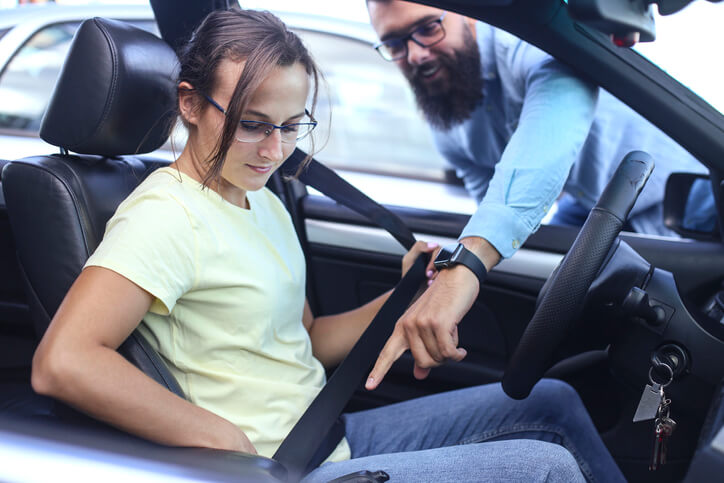Welcome to your comprehensive guide on Michigan driving laws! Knowing these regulations is crucial to ensure your safety and stay compliant while traversing the state’s roads.
Key Takeaways
- Navigate Michigan’s speed limits for safe driving.
- Understand seat belt and child seat laws to protect pedestrians, particularly children.
- Be aware of DUI/OWI regulations, traffic violation penalties, and other vehicle laws in the state.
Navigating Speed Limits in Michigan
Speed limits drastically impact safety on the roads. In Michigan, these limits are meticulously set based on road design, traffic volume, and accident history. As a driver, adhering to these speed limits is not only the law but also lowers the risk of accidents.
Michigan has specific speed limits for different types of roads and bridges. For instance, the maximum speed limit on freeways is typically 70 mph, but it can go up to 75 mph in certain sections—bridges like the Mackinac and the Sault Ste. Marie International have designated speed limits of 45 mph and 30 mph, respectively.
Freeway Speed Regulations
Grasping freeway speed limits in Michigan is imperative, given that these roads are frequently the fastest and busiest. Most freeways in the state have a standard speed limit of 70 mph, but specific segments may have an increased limit of 75 mph.
The Michigan Department of Transportation, in collaboration with the Michigan State Police, sets these speed limits. They consider several factors, including:
- the 85th percentile speed
- road design
- traffic volume
- accident history
- engineering studies
These efforts aim to set speed limits that ensure safety while maintaining efficient traffic flow.
Residential and School Zone Speeds
Due to the prevalence of pedestrians, particularly children, speed limits in residential areas and school zones are generally lower. In Michigan, the standard speed limit for residential areas is 25 mph. Local law enforcement agencies ensure drivers adhere to this limit, thus contributing to the safety of these residential communities.
School zones also have a 25 mph speed limit in Michigan. Violating this speed limit can lead to hefty fines ranging from $75 to $1,000, depending on the degree of the speed violation. Hence, drivers must stay alert and respect these speed limits, particularly in school zones.
Understanding Michigan's Seat Belt and Child Seat Laws
In Michigan, seat belts and child seats go beyond comfort; they are a legal requirement for safety. All drivers, front-seat passengers, and any child passengers under the age of 16, regardless of where they’re seated in the vehicle, must wear seat belts.
Children under 8 years old or shorter than 4 feet 9 inches must be secured in either a car seat or booster seat for their safety in a vehicle. This regulation is an important safety measure to protect young children during travel. Children under 4 years old may need a rear-facing or forward-facing child seat, depending on their age and size.
Booster Seat Guidelines
In Michigan, the importance of child safety on the road is reflected in the law requiring children under 8 years old or under 4’9″ to use a booster seat. Failing to adhere to these guidelines could result in fines and potential child endangerment charges.
Bear in mind that this regulation doesn’t have any exemptions. Ensuring your child is secured in a booster seat isn’t just about avoiding penalties; it’s about their safety.
Rear-facing and Forward-facing Seats
In Michigan, infants must be secured in rear-facing car seats until they attain a weight of 40 to 50 pounds and a height of 49 inches. It’s recommended for children to transition to a forward-facing car seat when they’re at least 4 years old.
Improper usage of a rear-facing or forward-facing seat can lead to penalties, including fines and points on the driver’s license. These regulations are in place to ensure that our youngest passengers are safe and secure on the road.
DUI and OWI: Alcohol and Drug Impairment Offenses
DUI and OWI: Alcohol and Drug Impairment Offenses
Driving under the influence (DUI) and operating while intoxicated (OWI) are severe offenses in Michigan. An OWI is committed when a person operates a vehicle while intoxicated, whereas an OWVI, or Operating While Visibly Impaired, is a less serious offense indicating impairment due to alcohol or drugs.
The penalties for a first-time OWI offense in Michigan include fines, a 180-day license suspension (or a year if BAC was 0.17% or higher), and potential incarceration. Comprehending these consequences and strategies to avoid a criminal conviction – plea agreements, pretrial diversion programs, or challenging evidence based on illegal collection – is necessary.
First Offense Consequences
First-time OWI offenders in Michigan can face fines ranging from $100 to $500. Additionally, there’s a suspension of driving privileges, the duration of which depends on the specifics of the case.
In addition, the consequences of a DUI conviction may include:
- Incarceration, with a possible sentence of up to 93 days for first-time offenders
- Requirements for alcohol education or treatment programs
- Community service
- Probation
- Installation of an ignition interlock device
These are just some of the potential consequences that can result from a DUI conviction. It is important to consult with a legal professional to understand the specific penalties in your jurisdiction.
Repeat Offender Penalties
Repeat OWI offenders in Michigan face even steeper penalties. A 10-year license suspension awaits those who repeatedly violate the law and must have an ignition interlock device installed.
The minimum jail time for repeat offenders is 5 days but can go up to one year. Fines can range from $200 to $1,000 for a second offense and $500 to $5,000 for a third offense.
License Requirements and Restrictions
Obtaining a driver’s license in Michigan requires the following steps:
- Meeting specific age requirements
- Completing a state-approved driver education program
- Passing written and vision tests
- Fulfilling supervised driving hours
- Passing a road skills test
- Providing necessary documentation for identity, residency, and Social Security verification
- Paying applicable fees.
Teen drivers must adhere to certain restrictions, including limitations on the number of passengers and driving within certain timeframes. For example, a driving curfew from 10 pm to 5 am applies to those with a Level 2 License.
Teen Driver Regulations
Michigan’s graduated licensing system for teen drivers is designed to ensure they have the necessary skills and experience to be safe on the road. This system operates through a three-stage process: Level 1 Learner’s License, Level 2 Intermediate License, and Level 3 Full License, each with distinct requirements and limitations.
Teen drivers with a Level 2 license must adhere to a curfew prohibiting them from driving between 10 pm and 5 am. They are also limited to having no more than one passenger under the age of 21 unless the additional passengers are immediate family members.
Motor Vehicle Operation Rules
Operating a motor vehicle in Michigan necessitates compliance with specific rules. This includes:
- Maintaining control of the vehicle
- Adhering to traffic laws
- Upholding a valid driver’s license, vehicle registration, and insurance
- Exercising reasonable care to ensure the safety of others on the road.
There are also specific laws for motorcycles and trucks. Motorcycle operators have to possess a valid motorcycle endorsement on their driver’s license and refrain from operating motorcycles under the influence of alcohol or drugs. On the other hand, trucks are subject to specific laws governing weight restrictions, size limitations, and requirements for securing cargo.
Motorcycle and Truck-Specific Laws
Motorcycle riders in Michigan are mandated to wear protective headgear, except for certain riders over the age of 21. However, motor vehicles, such as trucks, are allowed a gross vehicle weight of up to 164,000 pounds.
Motorcycle drivers must obtain a CY endorsement on their driver’s license. Truck drivers, especially those operating oversized or overweight vehicles, require specific permits, which can be found in the Michigan Center for Truck Safety’s annual Truck Driver’s Guidebook.
Handling Adverse Driving Conditions
Navigating in unfavorable weather conditions presents a challenge. While Michigan doesn’t enforce the use of snow tires, their use during snowy and icy conditions is recommended for improved traction and safety. Preparing your vehicle for winter involves:
- Inspecting the battery, brakes, and cooling system
- Replacing wiper blades and wiper fluid
- Considering winter-ready tires
- Assessing the functionality of the car battery.
During a snowstorm, it’s advisable to:
- Maintain a consistent rate of acceleration
- Slow down smoothly
- Clear your vehicle of snow and ice
- Have an emergency supply kit in your car
If stranded, staying inside your vehicle and waiting for emergency services is recommended.
Winter Weather Preparedness
Under Michigan laws, motorists must remove snow, ice, and slush from their vehicles before driving. This includes clearing snow and ice from the car’s lights and mirrors to promote safe winter driving in Michigan.
To stay updated on road conditions during the winter, drivers can use the MiDrive map to check for incidents and traffic cameras and stay updated on weather advisories and road conditions.
Penalties for Traffic Violations
Various penalties, including fines and points on the driver’s record, are enforced for traffic violations in Michigan. For example, exceeding the speed limit by 1-5 MPH in a 70 mph zone can lead to a $115 fine, while exceeding the speed limit by 26+ MPH can result in a $210 fine and 4 points on the driver’s record.
In Michigan’s points system, minor offenses such as running a red light or exceeding the speed limit by 10 mph attract one to three points. These points are automatically removed from the driving record after two years.
Points System and License Suspension
The points allocation system in Michigan assigns a specific number of points to each type of traffic violation, ranging from one to six based on the severity of the offense. These points stay on a driver’s license for two years from the date of conviction.
Accumulating 12 points within a 24-month can lead to a driver’s license suspension in Michigan. Penalties for license suspension may include up to 93 days in jail, a maximum $500 fine, and cancellation of the vehicle’s registration plates.
Known Dangerous and Problematic Intersections and Roadways in Michigan
Navigating specific roads and intersections in Michigan requires a tailored approach, considering the unique challenges each presents. Here are some key roads and intersections and DriverZ’s advice for each:
- I-94 in Detroit Area:
-
- Challenge: Heavy traffic and frequent lane changes.
- Advice: Maintain a consistent speed, stay alert for sudden stops, and be prepared for aggressive drivers. Use turn signals well in advance for lane changes.
- The Intersection of Orchard Lake and 14 Mile Road, Farmington Hills:
-
- Challenge: Complex traffic patterns and high volume.
- Advice: Pay close attention to traffic signals and road signs. Anticipate delays during peak hours and remain patient.
- US-23 near Ann Arbor:
-
- Challenge: Speed fluctuations and merging traffic.
- Advice: Keep a safe following distance and be vigilant for vehicles entering and exiting the highway. Adjust your speed accordingly to maintain smooth traffic flow.
- Woodward Avenue in Detroit:
-
- Challenge: Pedestrian traffic and frequent stops.
- Advice: Drive at a reduced speed and watch for pedestrians, especially near crosswalks and during events. Always yield to pedestrian traffic.
- The Intersection of Hall Road and Schoenherr, Sterling Heights:
-
- Challenge: High accident rate and congestion.
- Advice: Approach with caution, especially during rush hours. Be prepared for sudden braking and watch for erratic lane changes from other drivers.
- M-59/Hall Road Corridor:
-
- Challenge: Heavy commercial traffic and frequent stoplights.
- Advice: Anticipate stop-and-go traffic and maintain a consistent, moderate speed. Stay aware of large trucks and commercial vehicles that require more space and time to maneuver.
- I-75 through Oakland County:
-
- Challenge: Construction zones and traffic shifts.
- Advice: Follow construction signage and lane shift indicators carefully. Reduce speed in construction zones and be prepared for unexpected lane closures or detours.
Each of these areas requires a heightened sense of awareness and a proactive approach to driving. It’s always important to stay updated on local traffic news and construction updates to anticipate and avoid potential delays or hazards.
Other Michigan Driving Laws
Distinct laws apply to different types of vehicles in Michigan. For example, electric vehicles have to pay an EV fee of $140 during registration and may also be subject to additional road taxes. The state government has also mandated that all state government vehicles be electric by 2040.
For those crossing the Grosse Ile Toll Bridge, the crossing fee for a car ranges from $4.00 to $7.00, while for a truck, it can go up to $32.00, determined by the number of axles. Accepted payment methods include cash, card, and the Bridge Pass.
Frequently Asked Questions
Can a 16-year-old drive past 10 pm in Michigan?
Due to Michigan’s curfew regulations, 16-year-olds are not allowed to drive past 10 pm unless they drive for employment or an authorized activity, accompanied by a parent or legal guardian.
What is the new driving law in Michigan?
Michigan’s new hands-free driving law makes it illegal to use a cell phone, including scrolling, searching, or calling, while behind the wheel. Any violation of this law will be subject to fines as of June 30, 2023.
Is eating while driving illegal in Michigan?
Eating while driving isn’t explicitly illegal in Michigan, but it can be a significant distraction and should be avoided for safety reasons.
Does Michigan have a left-lane law?
Yes, Michigan has a left-lane law that prohibits driving at speeds “less than is reasonable and proper” or impedes the normal and reasonable movement of traffic.
What is the speed limit in Michigan if not posted?
Michigan has a default speed limit of 25 mph for residential areas and 55 mph for trunk lines and county highways.









